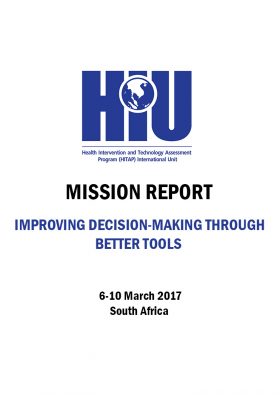This website uses cookies so that we can provide you with the best user experience possible. Cookie information is stored in your browser and performs functions such as recognising you when you return to our website and helping our team to understand which sections of the website you find most interesting and useful.
Mission Report: IMPROVING DECISION-MAKING THROUGH BETTER TOOLS

Details
With governments around the world committing to Universal Health Coverage, it is increasingly important to ensure that they have the right tools to the address the challenges they will face. Evidence-informed decision making to ensure efficient allocation of resources in the system is vital. The International Decision Support Initiative (iDSI), in pursuing its goal to assist policymakers in using evidence for healthcare, supported the development of two knowledge products. The book “What’s in, What’s out: Designing Benefits for Universal Health Coverage” and the Guide to health Economic Analysis and Research (GEAR) Online Resource were launched in South Africa from March 6-8, 2017.
The health benefits package is the set of services that are made available for the public. This means they are decided on implicitly or explicitly to account for constrained resources. No country can offer access to all available treatments; therefore, serious discussion needs to take place to allocate the funds available in an efficient manner. “What’s in, What’s Out” aims to assist policymakers in creating an explicit health benefits package. A two-and-a-half-day workshop was conducted from March 6 – 8, 2017. On March 9, 2017, a meeting with high level stakeholders from South Africa (and larger sub-Saharan Africa) was held to discuss their health benefits packages and what next steps they will take to formalize or improve them. The editors of the “What’s in, What’s out” book, Dr. Amanda Glassman, Dr. Usula Gideon, and Prof. Peter C. Smith, coordinated the discussions over the three days.
In keeping with this goal, the HITAP team also launched the GEAR – a global platform designed to assist researchers in low- and middle-income countries (LMICs) conduct policy relevant and high-quality health economics research. According to HITAP’s study in 2015, researchers in LMICs face different methodological challenges in conducting economics research for healthcare. The GEAR provides immediate solutions to these challenges through visual mapping of solutions, providing guidelines, and connecting researchers with experts who can respond to their queries.
Finally, the International Decision Support Initiative (iDSI) continues to provide assistance for evidence-informed priority-setting globally. The members met on March 10, 2017, for the board meeting to discuss the achievements and plans for the coming year, the managerial aspects such as finances and deliverables, communications, global partnerships, and other issues.
Objectives:
1. To launch the GEAR to a global audience.
2. To support the launching of the “What’s in, What’s Out” health benefits package guide.
3. To facilitate the next steps for the iDSI alongside its partners.




